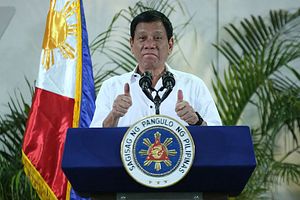Canada said Wednesday that by the end of June it will remove truckloads of garbage which Filipino officials say were illegally shipped to the Philippines years ago.
Canadian Environment Minister Catherine McKenna said the government has awarded a contract to French shipping giant Bollore Logistics Canada that calls for the return of 69 containers filled with household waste and electronic garbage.
“The company will begin preparation for shipping in the coming days. The removal will be complete by the end of June, as the waste must be safely treated to meet Canadian safety and health requirements,” McKenna’s department said in a statement.
The trash is expected to be back in Canada by the end of summer.
Salvador Panelo, a spokesman for Philippine President Rodrigo Duterte, held a news conference earlier Wednesday to announce that Duterte has ordered officials to look for a private shipping company to transport the garbage to Canadian territory in an escalation of his increasingly adversarial stance.
“If Canada will not accept their trash, we will leave the same within its territorial waters or 12 nautical miles out to sea from the baseline of any of their country’s shores,” Panelo said. “The president’s stance is as principled as it is uncompromising: The Philippines as an independent sovereign nation must not be treated as trash by other foreign nations.”
The Philippine government recalled its ambassador and consuls in Canada last week over Ottawa’s failure to comply with a May 15 deadline to take back the garbage.
Canadian Prime Minister Justin Trudeau said last week that Canada has been working hard with Philippine officials to resolve the problem and hoped to strike a resolution quickly though he gave no time frame.
In 2017, Trudeau said legal issues preventing the return of the garbage to Canada had been resolved. “This is a situation that is unacceptable and has gone on too long,” Trudeau said Wednesday.
Canada is also looking at ways to hold the responsible parties to account.
At least 103 containers of household trash, including plastic bottles and bags, newspapers and diapers, were shipped in batches from Canada to the Philippines from 2013 to 2014. Thirty-four were already dealt with by Filipino authorities. Most of the other 69 containers are in two ports in
Manila and northern Subic Freeport, sparking protests from environmental activists.
Philippine officials say all the containers were falsely declared by a private firm as recyclable plastic scraps and asked Canada to take back the garbage.
Duterte raised the garbage issue in a speech last month while officials from both countries were already discussing a resolution. The volatile president said he was ready to “declare war” against Canada over the issue.
Panelo said Duterte was upset “about the inordinate delay of Canada in shipping back its containers of garbage,” adding “We are extremely disappointed with Canada’s neither here nor there pronouncement on the matter.”
“Obviously, Canada is not taking this issue nor our country seriously. The Filipino people are gravely insulted about Canada treating this country as a dumpsite,” Panelo said.
Canadian Foreign Minister Chrystia Freeland said she hoped her government’s move would calm the matter.
“I think we have taken a big step with the announcement today and we are moving as quickly as we can, bearing in mind, you know, the need to take due care to get this resolved once and for all,” she said Wednesday.
The dispute has been the latest strain in Philippine relations with Canada under Duterte. Last year, he ordered the cancellation of a multimillion-dollar agreement to buy 16 helicopters from Canada after Trudeau’s government decided to review the deal due to concerns that the Philippine military might use the aircraft in counterinsurgency assaults.
By Rob Gillies and Jim Gomez for The Associated Press.

































